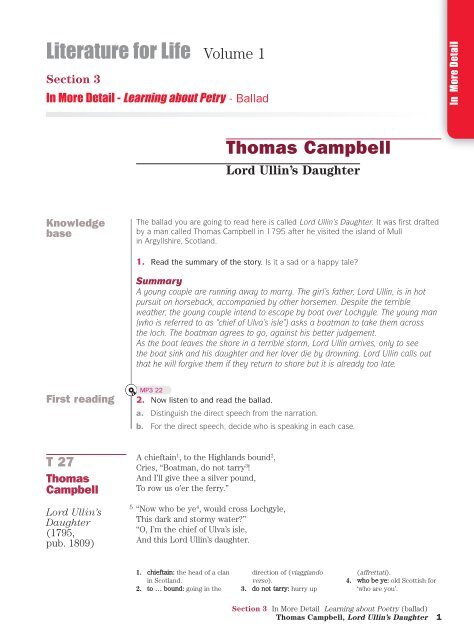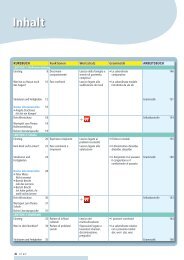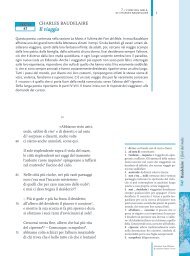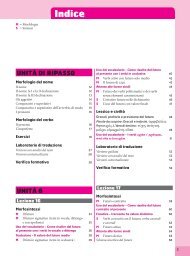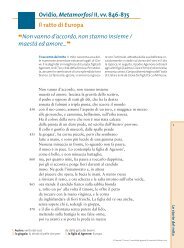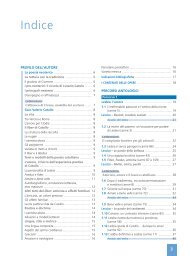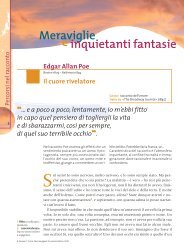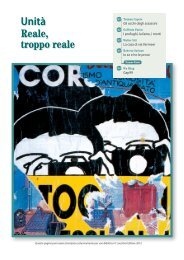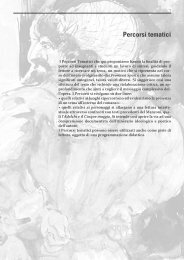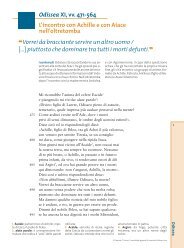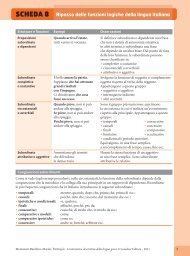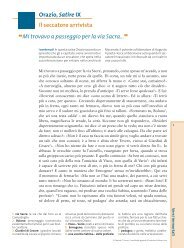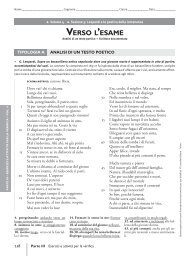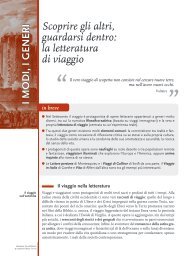Thomas Campbell, Lord Ullin's Daughter
Thomas Campbell, Lord Ullin's Daughter
Thomas Campbell, Lord Ullin's Daughter
Create successful ePaper yourself
Turn your PDF publications into a flip-book with our unique Google optimized e-Paper software.
Literature for Life Volume 1<br />
Section 3<br />
In More Detail - Learning about Petry - Ballad<br />
In More Detail<br />
<strong>Thomas</strong> <strong>Campbell</strong><br />
<strong>Lord</strong> Ullin’s <strong>Daughter</strong><br />
Knowledge<br />
base<br />
The ballad you are going to read here is called <strong>Lord</strong> Ullin’s <strong>Daughter</strong>. It was first drafted<br />
by a man called <strong>Thomas</strong> <strong>Campbell</strong> in 1795 after he visited the island of Mull<br />
in Argyllshire, Scotland.<br />
1. Read the summary of the story. Is it a sad or a happy tale<br />
Summary<br />
A young couple are running away to marry. The girl’s father, <strong>Lord</strong> Ullin, is in hot<br />
pursuit on horseback, accompanied by other horsemen. Despite the terrible<br />
weather, the young couple intend to escape by boat over Lochgyle. The young man<br />
(who is referred to as “chief of Ulva’s isle”) asks a boatman to take them across<br />
the loch. The boatman agrees to go, against his better judgement.<br />
As the boat leaves the shore in a terrible storm, <strong>Lord</strong> Ullin arrives, only to see<br />
the boat sink and his daughter and her lover die by drowning. <strong>Lord</strong> Ullin calls out<br />
that he will forgive them if they return to shore but it is already too late.<br />
First reading<br />
MP3 22<br />
2. Now listen to and read the ballad.<br />
a. Distinguish the direct speech from the narration.<br />
b. For the direct speech, decide who is speaking in each case.<br />
T 27<br />
<strong>Thomas</strong><br />
<strong>Campbell</strong><br />
<strong>Lord</strong> Ullin’s<br />
<strong>Daughter</strong><br />
(1795,<br />
pub. 1809)<br />
5<br />
A chieftain 1 , to the Highlands bound 2 ,<br />
Cries, “Boatman, do not tarry 3 !<br />
And I’ll give thee a silver pound,<br />
To row us o’er the ferry.”<br />
“Now who be ye 4 , would cross Lochgyle,<br />
This dark and stormy water”<br />
“O, I’m the chief of Ulva’s isle,<br />
And this <strong>Lord</strong> Ullin’s daughter.<br />
1. chieftain: the head of a clan<br />
in Scotland.<br />
2. to … bound: going in the<br />
direction of (viaggiando<br />
verso).<br />
3. do not tarry: hurry up<br />
(affrettati).<br />
4. who be ye: old Scottish for<br />
‘who are you’.<br />
Section 3 In More Detail Learning about Poetry (ballad)<br />
<strong>Thomas</strong> <strong>Campbell</strong>, <strong>Lord</strong> Ullin’s <strong>Daughter</strong> 1
10<br />
15<br />
“And fast before her father’s men<br />
Three days we’ve fled 5 together,<br />
For should he find us in the glen 6 ,<br />
My blood would stain the heather 7 .<br />
“His horsemen hard behind us ride;<br />
Should they our steps discover,<br />
Then who will cheer my bonny bride 8<br />
When they have slain 9 her lover”<br />
In More Detail<br />
20<br />
Out spoke the hardy Highland wight 10 ,<br />
“I’ll go, my chief — I’m ready;<br />
It is not for your silver bright,<br />
But for your winsome 11 lady:<br />
25<br />
“And by my word! the bonny bird<br />
In danger shall not tarry;<br />
So though the waves are raging white,<br />
I’ll row you o’er the ferry.”<br />
By this the storm grew loud apace,<br />
The water-wraith was shrieking 12 ;<br />
And in the scowl 13 of heaven each face<br />
Grew dark as they were speaking.<br />
“Boatman, do not tarry!”, illustration for<br />
<strong>Lord</strong> Ullin’s <strong>Daughter</strong> by Herbert N. Rudeen<br />
(in Journeys Through Bookland, Vol. 6, by<br />
Charles H. Sylvester, Chicago, Bellows-Reeve<br />
Company Publishers, 1922).<br />
30<br />
35<br />
40<br />
But still as wilder blew the wind,<br />
And as the night grew drearer 14 ,<br />
Adown the glen rode armed men,<br />
Their trampling sounded nearer.<br />
“O haste thee 15 , haste!” the lady cries,<br />
“Though tempests round us gather;<br />
I’ll meet the raging of the skies,<br />
But not an angry father.”<br />
The boat had left a stormy land,<br />
A stormy sea before her, —<br />
When, O! too strong for human hand,<br />
The tempest gather’d o’er her 16 .<br />
And still they row’d 17 amidst the roar<br />
Of waters fast prevailing:<br />
<strong>Lord</strong> Ullin reach’d that fatal shore,<br />
His wrath was changed to wailing 18 .<br />
5. fled: escaped (siamo<br />
fuggiti).<br />
6. glen: Scottish for ‘valley’.<br />
7. heather: a moorland plant<br />
(erica).<br />
8. bonny bride: beautiful wife<br />
to be (bella sposa).<br />
9. slain: killed (ucciso).<br />
10. the hardy Highland wight:<br />
here it refers to the<br />
boatman (il tipo robusto<br />
delle Highlands).<br />
11. winsome: beautiful (bella).<br />
12. The water-wraith was<br />
shrieking: the demon of<br />
the loch was screaming<br />
(urlava il mostro delle<br />
acque).<br />
13. scowl: dark, angry face (il<br />
volto scuro e arrabbiato).<br />
14. drearer: darker (più<br />
scura).<br />
15. haste thee: hurry up<br />
(affrettati).<br />
16. gather’d o’er her: met<br />
above her (si accumulò<br />
sopra la barca).<br />
17. row’d: used the oars<br />
(remavano).<br />
18. His wrath was changed to<br />
wailing: his anger became<br />
crying (la sua rabbia<br />
diventò un lamento).<br />
Section 3 In More Detail Learning about Poetry (ballad)<br />
<strong>Thomas</strong> <strong>Campbell</strong>, <strong>Lord</strong> Ullin’s <strong>Daughter</strong> 2
45<br />
50<br />
For sore dismay’d 19 through storm and shade,<br />
His child he did discover: —<br />
One lovely hand she stretch’d for aid,<br />
And one was round her lover.<br />
“Come back! come back!” he cried in grief 20 ,<br />
“Across this stormy water:<br />
And I’ll forgive your Highland chief,<br />
My daughter! — O my daughter!<br />
In More Detail<br />
55<br />
’Twas vain 21 : the loud waves lash’d 22 the shore,<br />
Return or aid preventing;<br />
The waters wild went o’er his child,<br />
And he was left lamenting.<br />
19. sore dismay’d: very<br />
upset<br />
(profondamente<br />
sconvolto).<br />
20. grief: sadness and<br />
pain (dolore).<br />
21. ’Twas vain: it was<br />
of no use (non<br />
serviva a nulla).<br />
22. lash’d: beat<br />
(colpivano).<br />
In more detail<br />
Content<br />
Form<br />
and language<br />
3. Where in the ballad does it say the following Find the line references and answer<br />
the additional question.<br />
a. (lines ________ ) The young chief offers the boatman money. How much exactly<br />
b. (lines ________ ) The lovers have been on the run for days. How many days exactly<br />
c. (lines ________ ) <strong>Lord</strong> Ullin will take his revenge if he catches them. How will he take<br />
his revenge<br />
d. (lines ________ ) The boatman agrees to go but not for the money. What is the reason<br />
why the boatman agrees<br />
e. (lines ________ ) When they hear the sound of approaching horsemen, it is the girl<br />
who insists that they leave immediately. What does she say she<br />
cannot face<br />
f. (lines ________ ) When she realises the boat is going to sink, the girl appeals to her<br />
father. What does she say or do exactly<br />
4. Describe the form of the poem by making notes below:<br />
a. no. of stanzas: __________________________________________________________________________<br />
b. no. of lines per stanza: __________________________________________________________________________<br />
c. line length: __________________________________________________________________________<br />
d. end-stopping: __________________________________________________________________________<br />
5. Focus on language.<br />
Which of these words and phrases would you use to describe the language of the poem<br />
<br />
elaborate<br />
<br />
lyrical<br />
<br />
full of exclamations<br />
<br />
narrative<br />
<br />
vague<br />
<br />
ornate<br />
<br />
simple<br />
<br />
graphic<br />
<br />
dramatic<br />
Section 3 In More Detail Learning about Poetry (ballad)<br />
<strong>Thomas</strong> <strong>Campbell</strong>, <strong>Lord</strong> Ullin’s <strong>Daughter</strong> 3
Sound features<br />
6. Work out the poem’s rhyme scheme.<br />
7. Look at the main stresses in stanza 1.<br />
a. How many stresses are there in each line<br />
´ ´ ´ ´<br />
A chieftain, to the Highlands bound,<br />
´ ´ ´<br />
Cries, “Boatman, do not tarry!<br />
´ ´ ´ ´<br />
And I’ll give thee a silver pound<br />
´ ´ ´<br />
To row us o’er the ferry!” —<br />
b. Which of these statements is true The poem alternates …<br />
a. … lines of pentameter and tetrameter.<br />
b. … lines of tetrameter and trimeter.<br />
c. … lines of trimeter and dimeter.<br />
c. Can you identify the same stress pattern in other stanzas of the poem<br />
In More Detail<br />
Type<br />
repetition of phrases<br />
anaphor<br />
alliteration<br />
consonance<br />
assonance<br />
Standard forms<br />
8. Repetition is an important feature of this poem.<br />
a. Find an example of each type of repetition.<br />
Examples<br />
b. What is the effect of the repetition Tick the statements you agree with.<br />
a. It makes the poem more musical.<br />
b. It makes the words easier to remember.<br />
c. It highlights important words and phrases.<br />
d. It makes the poem boring and predictable.<br />
9. Here is a checklist of the main features of the standard form known as the<br />
traditional or folk ballad. Which features can you link to the ballad <strong>Lord</strong> Ullin’s <strong>Daughter</strong><br />
a. The authors of ballads are anonymous (usually minstrels and troubadours) and their<br />
narrators are impersonal.<br />
b. They were handed down orally and changed as they passed from person to person and<br />
from country to country. They were generally not written down until the 18th century.<br />
c. Ballads are meant for performance, with or without musical accompaniment, and so<br />
they contain many sound features, especially repetition, which make them musical<br />
and memorable.<br />
d. A key feature of ballads is their simplicity. The storyline is simple, often tragic, and<br />
focuses on action. There are no descriptive passages. The characters are<br />
straightforward and are not psychologically complex. The language is lexically and<br />
syntactically simple and contains stock phrases or formulae and codes which<br />
audiences immediately recognise.<br />
e. The traditional ballad stanza is a quatrain and usually alternates lines of tetrameter<br />
and trimeter (4-3-4-3 stress pattern). Different rhyme schemes are present but the<br />
most common are abab and abcb.<br />
f. Predominant themes of ballad stories are tragic ones of love, death, revenge,<br />
betrayal, conflict.<br />
Section 3 In More Detail Learning about Poetry (ballad)<br />
<strong>Thomas</strong> <strong>Campbell</strong>, <strong>Lord</strong> Ullin’s <strong>Daughter</strong> 4
BIOGRAPHY IN BRIEF<br />
Read the biography and find out how the text and the author’s life are linked.<br />
In More Detail<br />
<strong>Campbell</strong>, <strong>Thomas</strong> (1777-1844)<br />
<strong>Thomas</strong> <strong>Campbell</strong> was born in Glasgow, Scotland in<br />
1777. He was educated at Glasgow High School and the<br />
University of Glasgow where he won prizes for classics<br />
and for poetry. During the holidays he worked as a tutor<br />
in the western Highlands and his poem Glenara and the<br />
ballad of <strong>Lord</strong> Ullin’s <strong>Daughter</strong> were both written after a<br />
visit to Mull at that time. He became famous for his poem<br />
The Pleasures of Hope which dealt with popular issues<br />
of the time such as the French Revolution, the partition<br />
of Poland and slavery. He travelled in Germany<br />
before returning to Scotland and then settling in<br />
London. He continued writing and travelling<br />
and was then elected <strong>Lord</strong> Rector of<br />
Glasgow University in 1826. His family life<br />
suffered a series of sad events —<br />
<strong>Campbell</strong>’s wife died in 1828, one of his<br />
two sons died and the other became<br />
insane. <strong>Campbell</strong>’s health suffered, too,<br />
and he withdrew from public life.<br />
He died in 1844.<br />
Scottish School, Portrait of <strong>Thomas</strong> <strong>Campbell</strong>, 1815, engraving<br />
(Private Collection).<br />
Section 3 In More Detail Learning about Poetry (ballad)<br />
<strong>Thomas</strong> <strong>Campbell</strong>, <strong>Lord</strong> Ullin’s <strong>Daughter</strong> 5
SAY IT RIGHT<br />
<strong>Lord</strong> Ullin’s <strong>Daughter</strong><br />
NOTEBOOK<br />
Fill in the gaps in the texts by using the words provided.<br />
In More Detail<br />
<strong>Lord</strong> Ullin’s <strong>Daughter</strong> is a literary<br />
ballad, that is to say it is part of the<br />
couple<br />
forgive<br />
body of ballads that were not of the graphic<br />
Isle of Mull<br />
oral tradition, but which were (1)<br />
killed<br />
down in the 18th and 19th centuries.<br />
lamenting<br />
Its author is known to be <strong>Thomas</strong><br />
<strong>Campbell</strong> and it was inspired by a trip<br />
loch<br />
love<br />
<strong>Campbell</strong> made to the (2) in quatrains<br />
1795. The ballad was then revised and repetition<br />
sink<br />
finally published in 1809.<br />
storm<br />
Its tragic story tells of a young (3)<br />
three<br />
who are running away to marry in the<br />
Highlands. The girl’s father, <strong>Lord</strong> Ullin,<br />
trimeter<br />
written<br />
has been in pursuit of them for<br />
(4) days. The couple are sure that,<br />
if they are caught, the young chieftan will be<br />
(5) by the <strong>Lord</strong> and his men. Despite the<br />
terrible weather, the young couple ask a boatman<br />
to take them across the (6) . The boatman<br />
agrees to go, against his better judgement.<br />
As the boat leaves the shore in a terrible (7) ,<br />
<strong>Lord</strong> Ullin arrives, only to see the boat<br />
his daughter and her lover die by drowning.<br />
<strong>Lord</strong> Ullin calls out that he will<br />
them<br />
and<br />
if they return to shore but it is already too late.<br />
The poem has many typical aspects of the<br />
traditional ballad. It is in<br />
alternating lines of tetrameter and<br />
with<br />
and<br />
an abab rhyme scheme. It is regular and musical,<br />
the musicality being reinforced by (12) .<br />
Its language makes use of both narration and<br />
dialogue, it is simple,<br />
and dramatic and<br />
makes frequent use of exclamations to add to its<br />
drama. The story, which deals with the theme of<br />
(14)<br />
(13)<br />
(10)<br />
and death, has a very tragic ending in which<br />
we see the repentant father<br />
of his beloved daughter.<br />
(15)<br />
(9)<br />
(11)<br />
(8)<br />
the loss<br />
Section 3 In More Detail Learning about Poetry (ballad)<br />
<strong>Thomas</strong> <strong>Campbell</strong>, <strong>Lord</strong> Ullin’s <strong>Daughter</strong> 6


